Charles E W Bean, Diaries, AWM38 3DRL 606/2/1 - January - March 1915 - Part 4
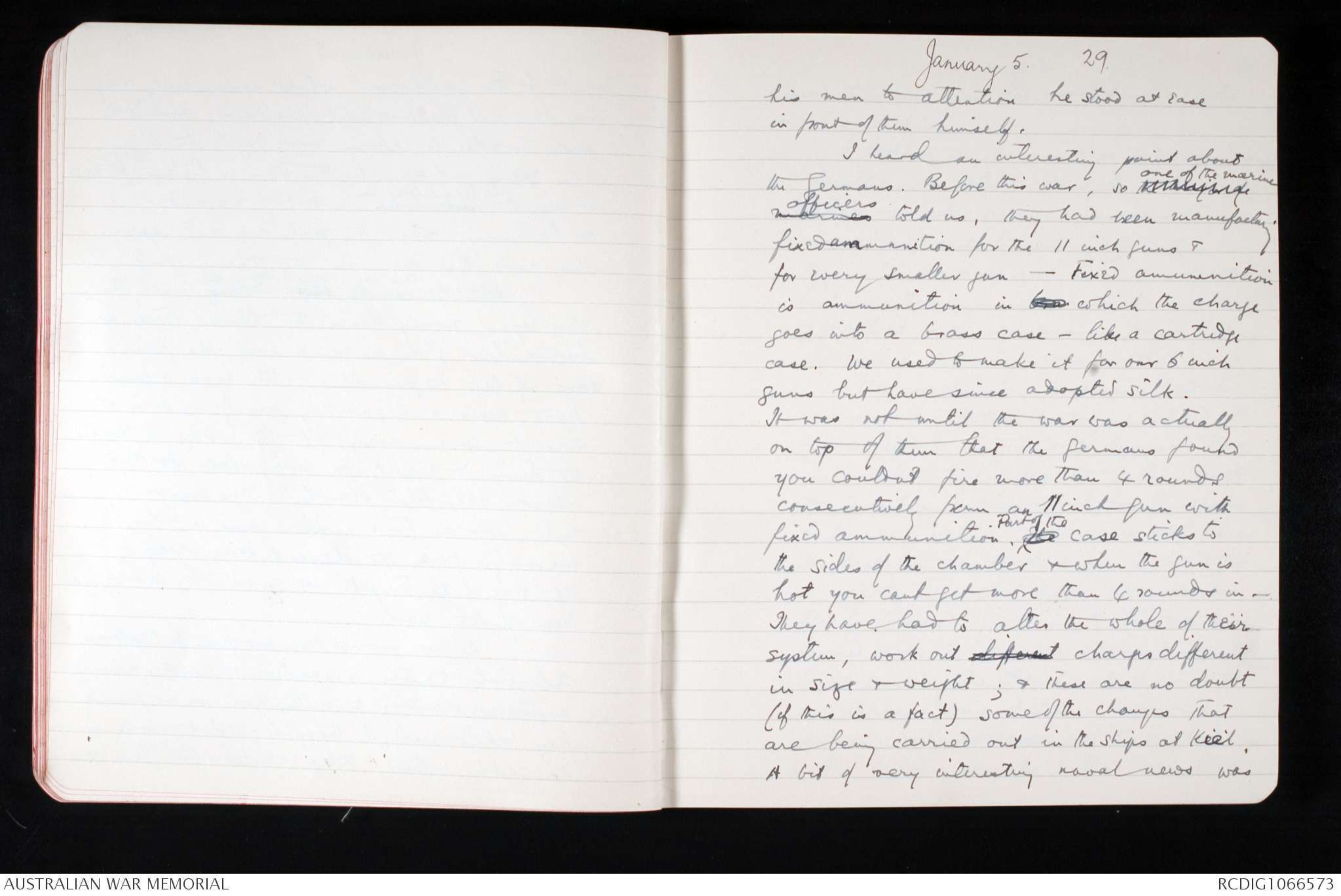
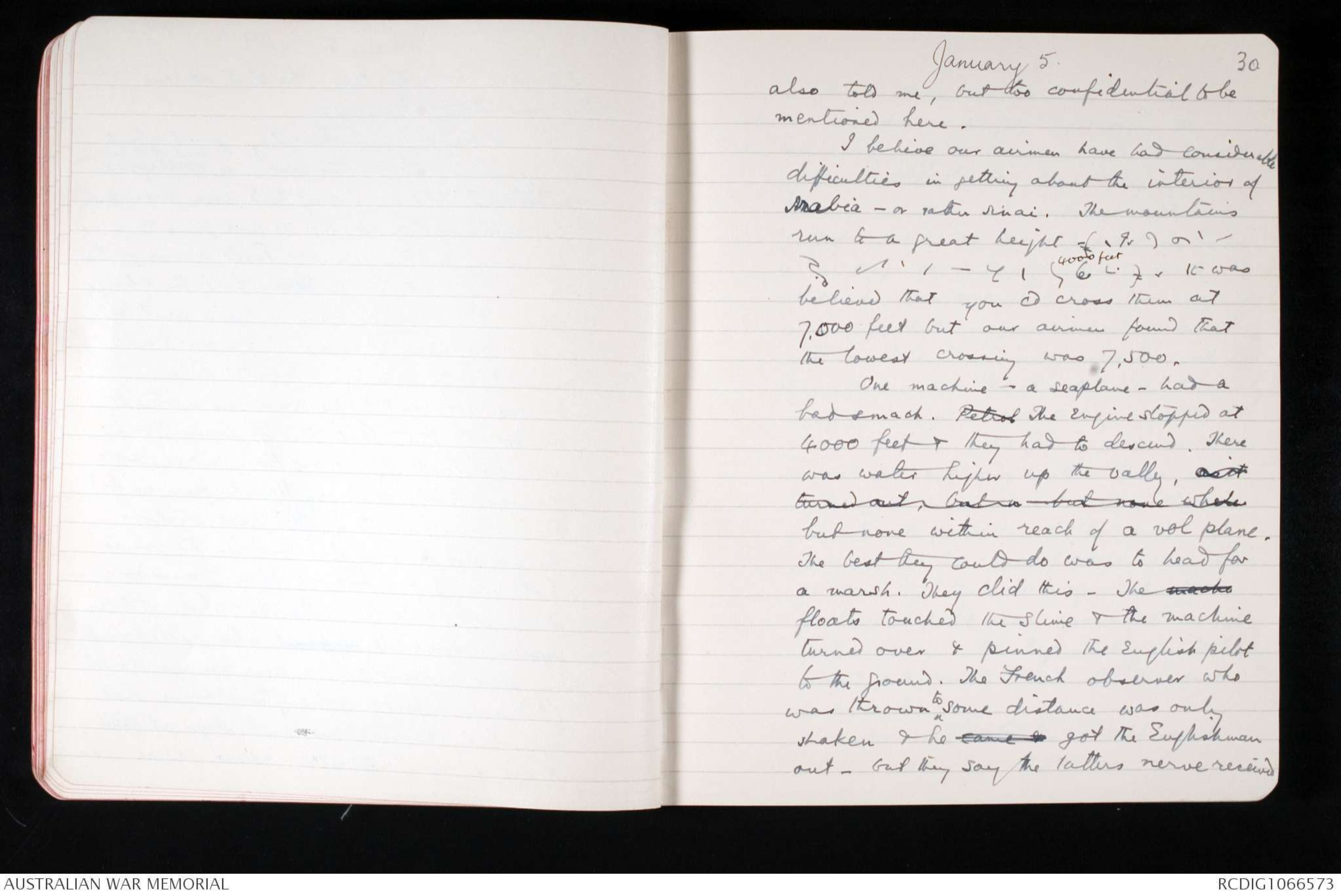
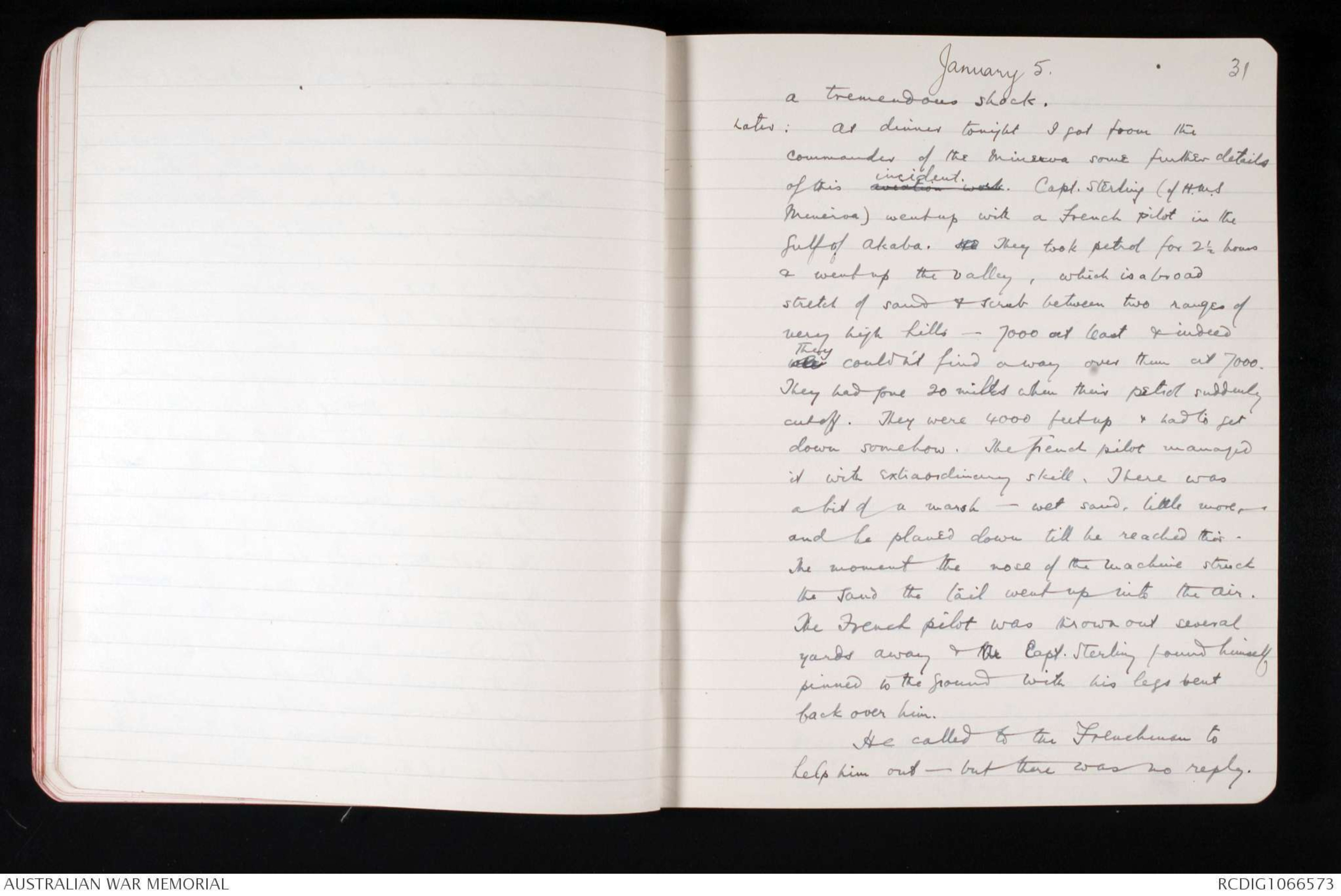
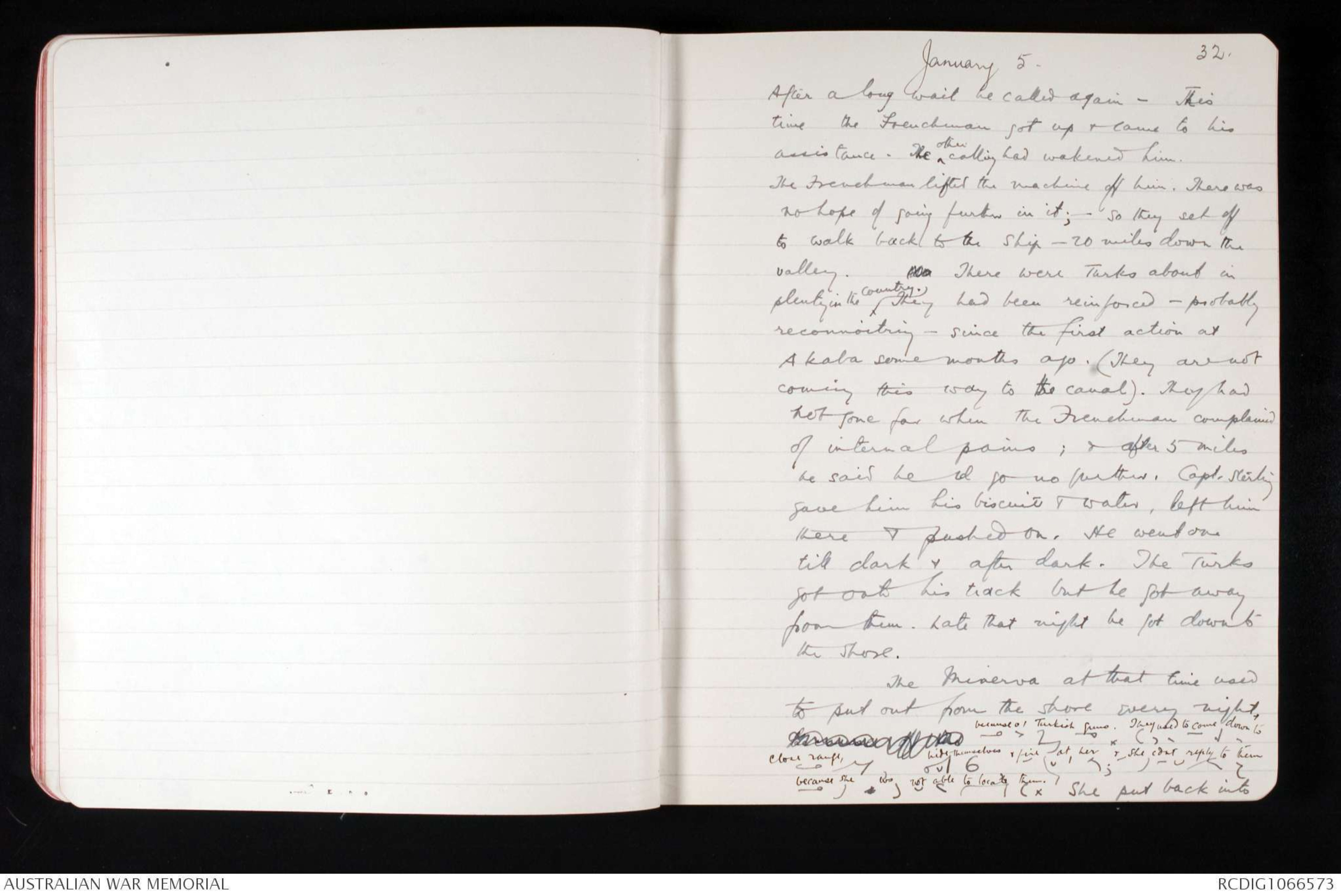
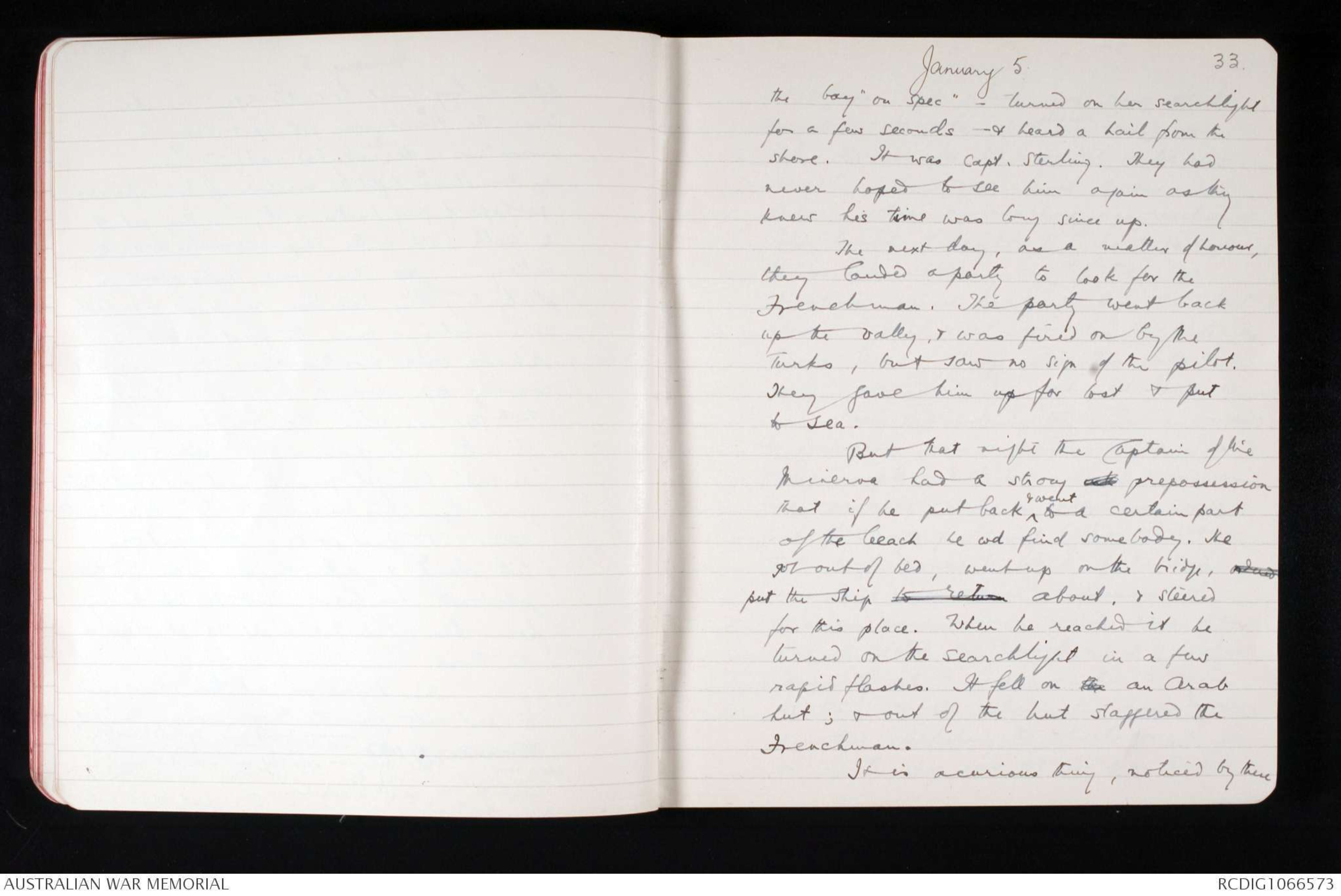
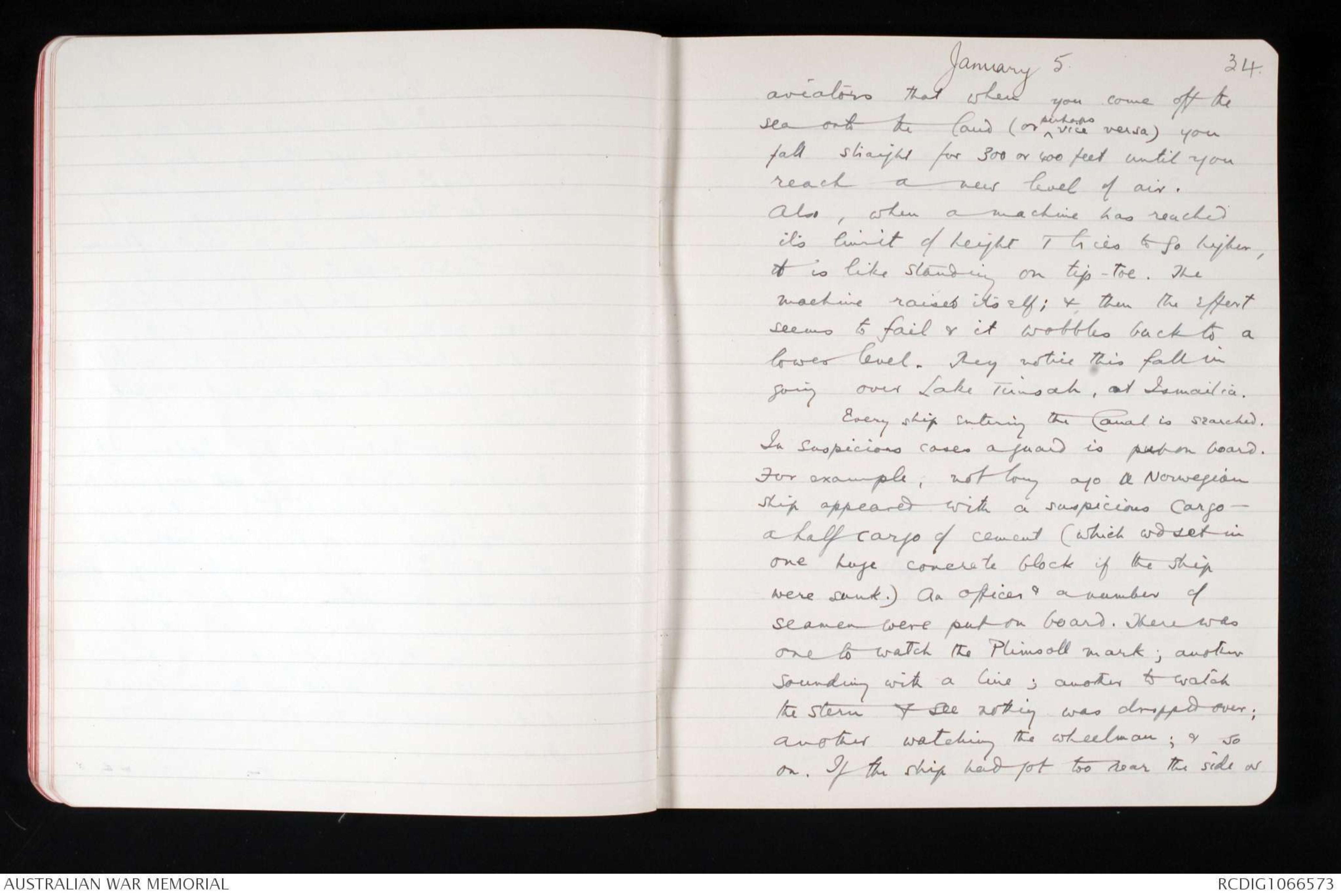
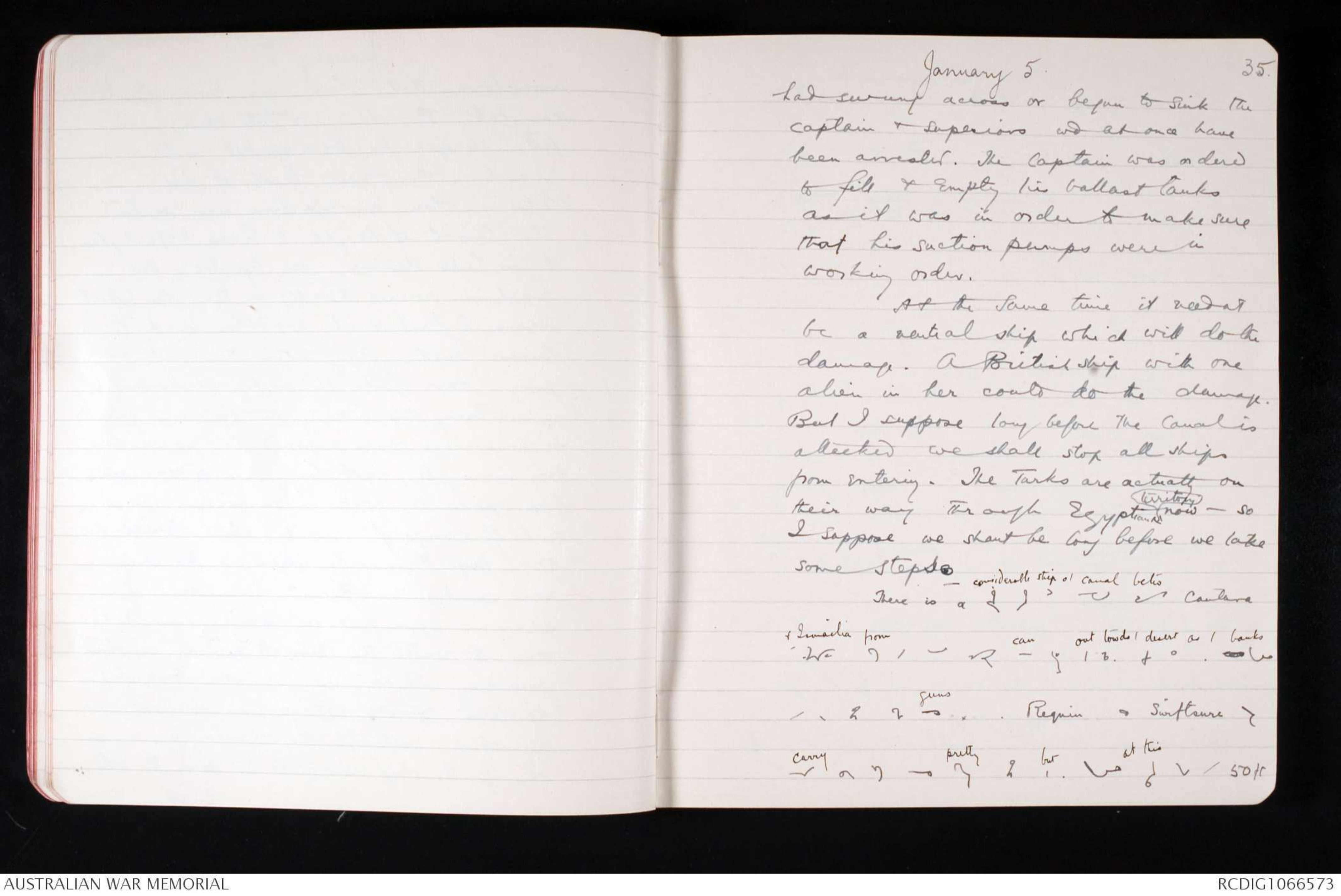
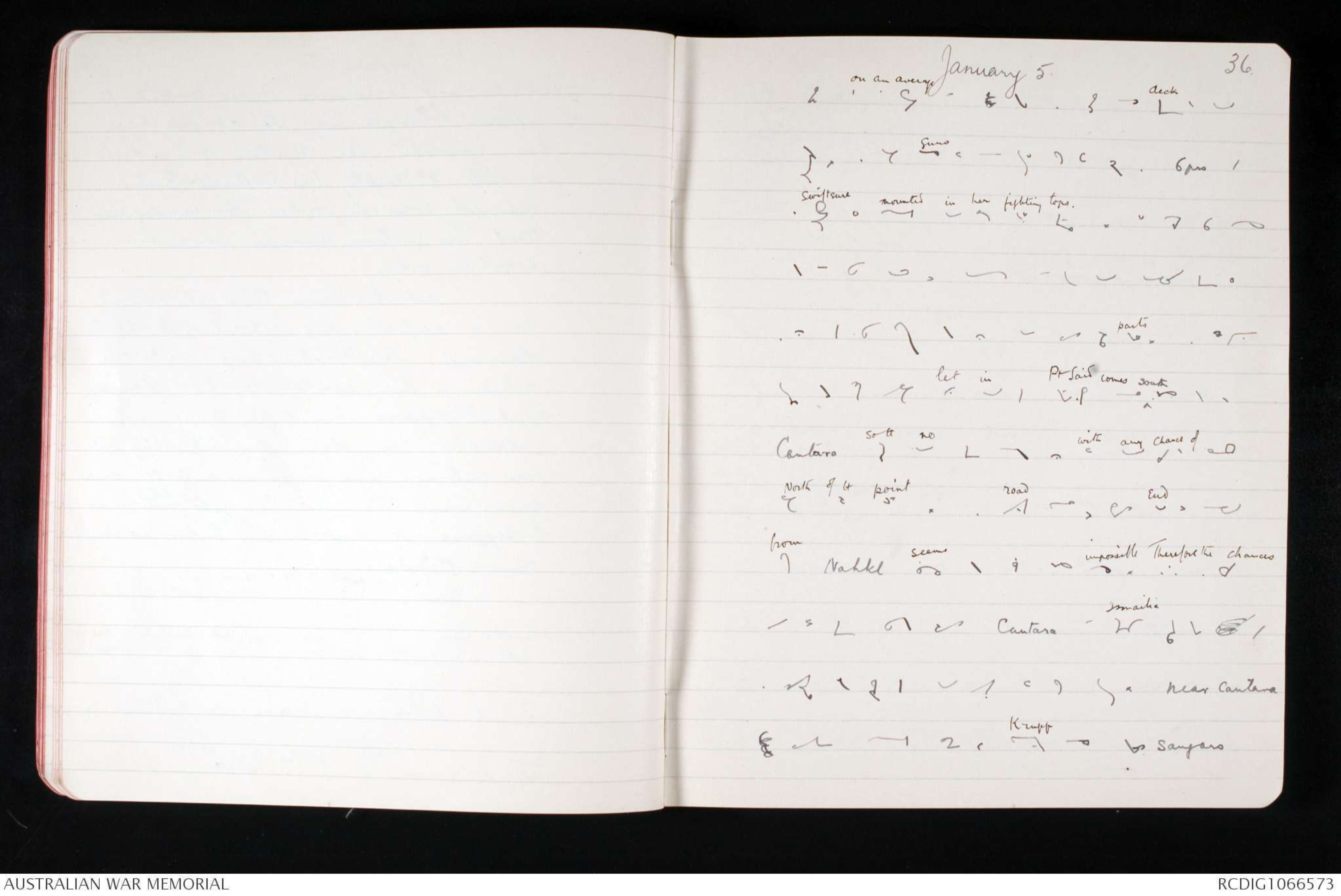
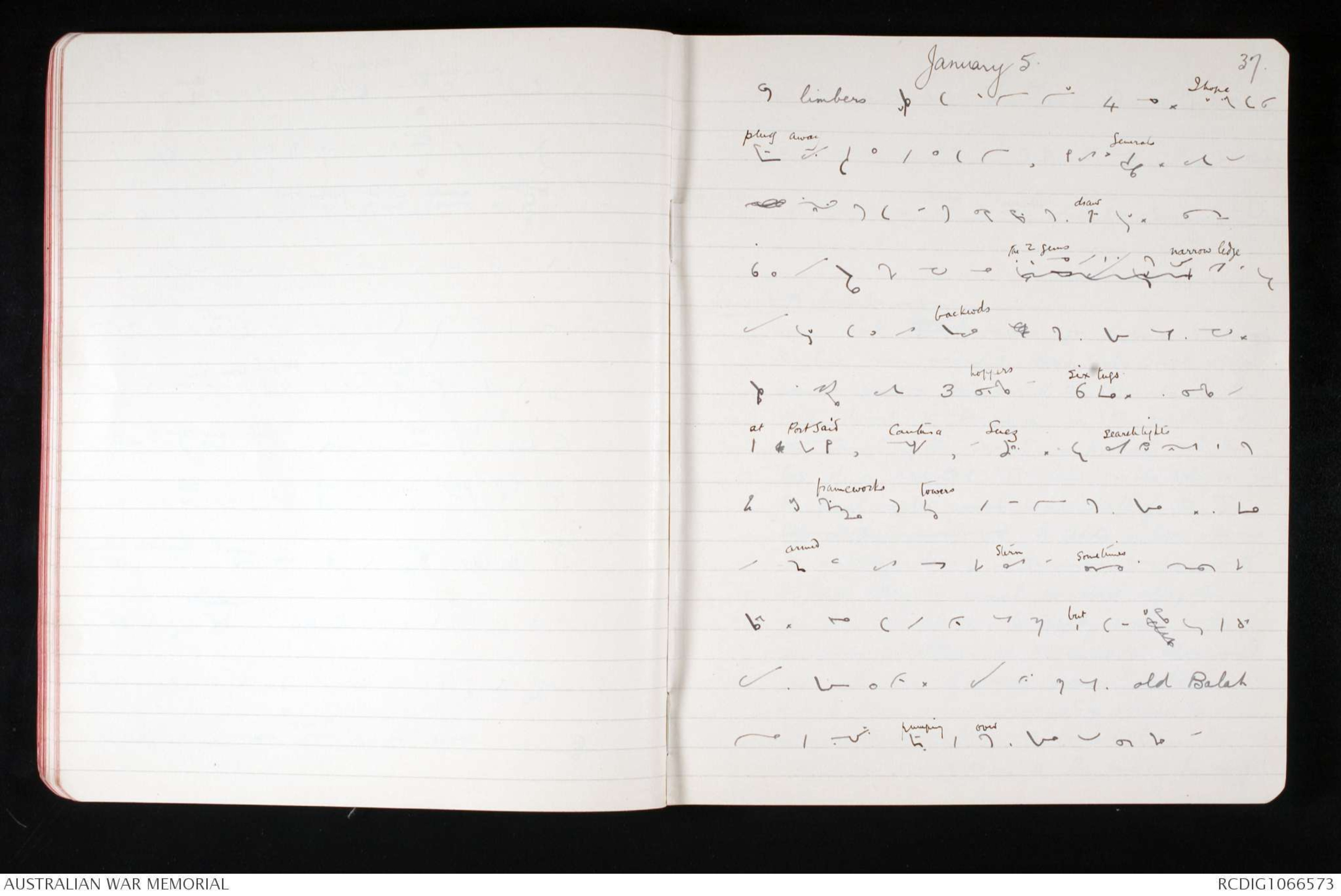
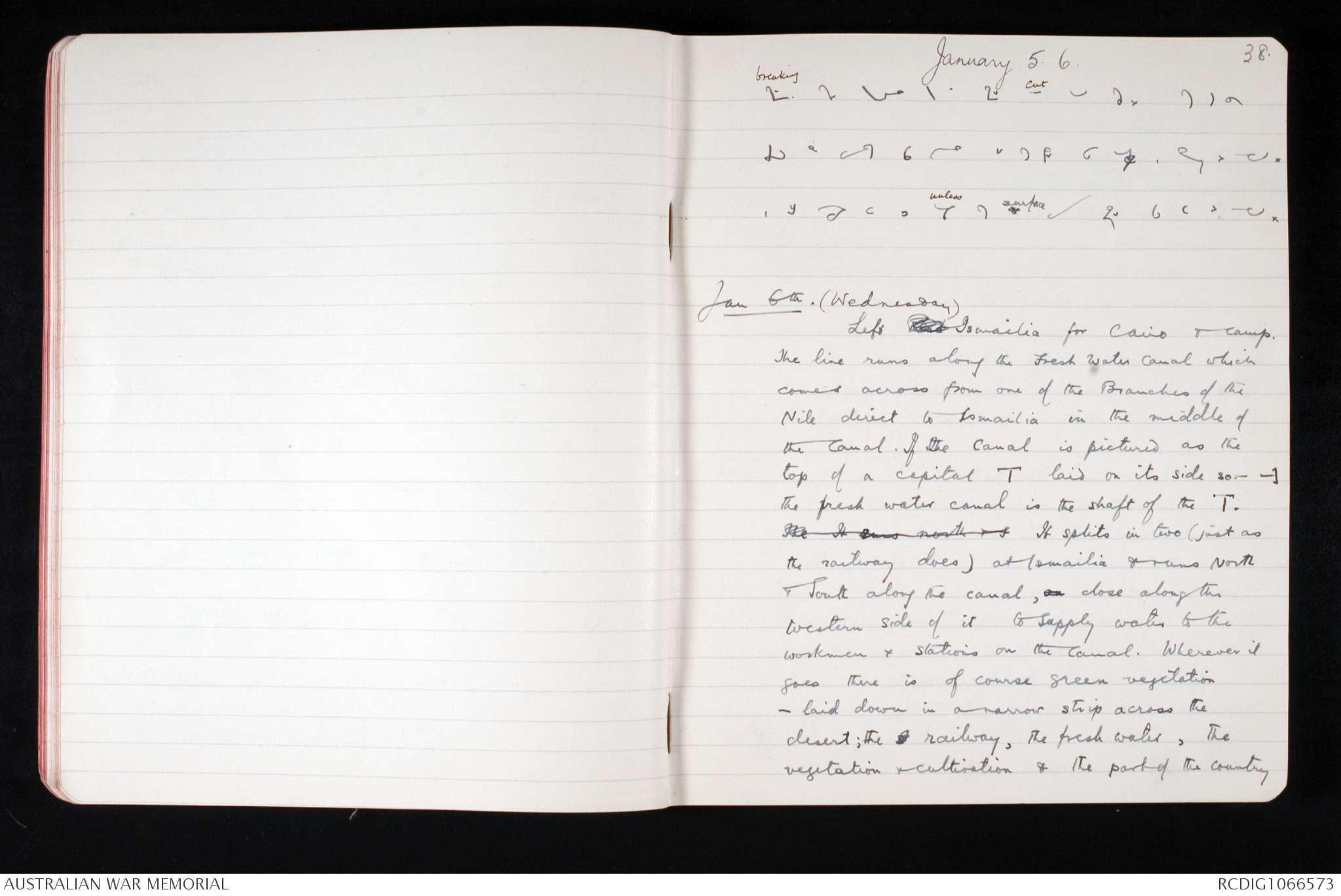
January 5. 29.
his men to attention he stood at ease
in front of them himself.
I heard an interesting point about
the Germans. Before this war, so the Major of one of the marinemarines officers told us, they had been manufacturing
fixed ammunition for the 11 inch guns &
for every smaller gun - Fixed ammunition
is ammunition in bra which the charge
goes into a brass case - like a cartridge
case. We used to make it for our 6 inch
guns but have since adopted silk.
It was not until the war was actually
on top of them that the Germans found
you couldn't fire more than 4 rounds
consecutively from an 11 inch gun with
fixed ammunition. ^ Part of the The case sticks to
the sides of the chamber & when the gun is
hot you cant get more than 4 rounds in -.
They have had to alter the whole of their
system, work out different charges different
in size & weight; & these are no doubt
(if this is a fact) some of the changes that
are being carried out in the ships at Kiel.
A bit of very interesting naval news was
January 5. 30.
also told me, but too confidential to be
mentioned here.
I believe our airmen have had considerable
difficulties in getting about the interior of
Arabia - or rather Sinai. The mountains
run to a great height [Shorthand]
[Shorthand] 4000 feet [Shorthand] & it was
believed that you cd cross them at
7,000 feet but our airmen found that
the lowest crossing was 7,500.
One machine - a seaplane - had a
bad smash. Petrol The engine stopped at
4000 feet & they had to descend. There
was water higher up the vally, as itturned out, but no - but none where
but none within reach of a vol plane.
The best they could do was to head for
a marsh. They did this. _ The machi
floats touched the slime & the machine
turned over & pinned the English pilot
to the ground. The French observer who
was thrown ^ to some distance was only
shaken & he came & got the Englishman
out _ but they say the latters nerve received
January 5. 31
a tremendous shock.
Later: At dinner tonight I got from the
commander of the Minerva some further details
of this aviation work incident. Capt. Sterling (of H.M.S.
Minerva) went up with a French pilot in the
Gulf of Akaba. He They took petrol for 2½ hours
& went up the valley, which is a broad
stretch of sand & scrub between two ranges of
very high hills - 7000 at least & indeedwhe They couldn't find a way over them at 7000.
They had gone 20 miles when their petrol suddenly
cut off. They were 4000 feet up & had to get
down somehow. The French pilot managed
it with extraordinary skill. There was
a bit of a marsh - wet sand, little more -
and he planed down till he reached this.
The moment the nose of the machine struck
the sand the tail went up into the air.
The French pilot was thrown out several
yards away & he Capt. Sterling found himself
pinned to the ground with his legs bent
back over him.
He called to the Frenchman to
help him out - but there was no reply.
January 5. 32.
After a long wait he called again - This
time the Frenchman got up & came to his
assistance. The ^ other calling had wakened him.
The Frenchman lifted the machine off him. There was
no hope of going further in it; - so they set off
to walk back to the ship - 20 miles down the
valley. xxx There were Turks about in
plenty in the ^ country. They had been reinforced - probably
reconnoitring - since the first action at
Akaba some months ago. (They are not
coming this way to the canal). They had
not gone far when the Frenchman complained
of internal pains; & after 5 miles
he said he cd go no further. Capt. Sterling
gave him his biscuits & water, left him
there & pushed on. He went on
till dark & after dark. The Turks
got onto his track but he got away
from them. Late that night he got down to
the shore.
The Minerva at that time used
to put out from the shore every night,xxxxxxx of xxx [Shorthand] ∧ because of the Turkish guns. They used to come down to
[Shorthand] ^ close range, hide themselves, and fire at her; and she cdnt reply to them
[Shorthand] ^ because she was not able to locate them. She put back into
January 5. 33.
the bay "on spec" - turned on her searchlight
for a few seconds - & heard a hail from the
shore. It was Capt. Sterling. They had
never hoped to see him again as they
knew his time was long since up.
The next day, as a matter of honour,
they landed a party to look for the
Frenchman. The party went back
up the valley, & was fired on by the
Turks, but saw no sign of the pilot.
They gave him up for lost & put
to sea.
But that night the Captain of the
Minerva had a strong xxx prepossession
that if he put back ^ & went to a certain part
of the beach he wd find somebody. He
got out of bed, went up on the bridge, ordered
put the ship to return about, & steered
for this place. When he reached it he
turned on the searchlight in a few
rapid flashes. It fell on the an Arab
hut; & out of the hut staggered the
Frenchman.
It is a curious thing, noticed by these
January 5. 34.
aviators that when you come off the
sea onto the land (or ^ perhaps vice versa) you
fall straight for 300 or 400 feet until you
reach a new level of air.
Also, when a machine has reached
its limit of height & tries to go higher,
it is like standing on tip-toe. The
machine raises its elf; & then the effort
seems to fail & it wobbles back to a
lower level. They notice this fall in
going over Lake Timsah, at Ismailia.
Every ship entering the Canal is searched.
In suspicious cases a guard is put on board.
For example, not long ago a Norwegian
ship appeared with a suspicious cargo -
a half cargo of cement (which wd set in
one huge concrete block if the ship
were sunk.) An officer & a number of
seamen were put on board. There was
one to watch the Plimsoll mark; another
sounding with a line; another to watch
the stern & see nothing was dropped over;
another watching the wheelman; & so
on. If the ship had got too near the side or
January 5. 35.
had swung across or begun to sink the
captain & superiors wd at once have
been arrested. The captain was ordered
to fill & empty his ballast tanks
as it was in order to make sure
that his suction pumps were in
working order.
At the same time it neednt
be a neutral ship which will do the
damage. A British ship with one
alien in her could do the damage.
But I suppose long before the Canal is
attacked we shall stop all ships
from entering. The Turks are actually on
their way through Egyptian ^ territory now - so
I suppose we shant be long before we take
some steps.
[Shorthand] ^ There is a considerable strip of the canal betw Cantara
∧ and Ismailia from [Shorthand] ^can [Shorthand] ∧ out towds desert as I banks
[Shorthand] ^ guns. Requin & Swiftsure [Shorthand]
[Shorthand] ^ carry [Shorthand] ^ pretty but at this [Shothand] 50 ft
January 5. 36.
[Shorthand] ^ on an average [Shorthand] ∧ deck [Shorthand]
[Shorthand] ^ guns [Shorthand] ^6 prs [Shorthand]
[Shorthand] ^ Swiftsure mounted in her fighting tops. [Shorthand]
[Shorthand]
[Shorthand] ^ parts. [Shorthand]
[Shorthand] ^ let in [Shorthand] ^ Pt Said comes ^ [Shorthand]
Cantara [Shorthand] so tt [Shorthand] ^ with any chance of [Shorthand]
[Shorthand] ^ North of It point [Shorthand] ^ road [Shorthand] ^ End [Shorthand]
[Shorthand] ^from Nahkl seems [Shorthand] ^ imposible. Therefore the chances
[Shorthand] ^ Cantara Ismailia [Shorthand]
[Shorthand] ^ near Cantara
[Shorthand] ^ Krupp [Shorthand] ^ sangars
January 5. 37.
[Shorthand] ^ limbers [Shorthand] ^ 4 [Shorthand] ^ I hope [Shorthand] l
[Shorthand] ^ plug away [Shorthand] ^ Generals. [Shorthand]
[Shorthand] ^ draws [Shorthand]
[Shorthand] ^ the 2 guns [Shorthand] ^ narrow ledge [Shorthand]
[Shorthand] ^ backwards[Shorthand]
[Shorthand] ^ 3 hoppers and six tugs[Shorthand]
[Shorthand] ^ at Port Said, Cantara, and Suez [Shorthand] ^ search lights
[Shorthand] ^ frameworks towers [Shorthand]
[Shorthand] ^ armed [Shorthand] ^ stern sometimes [Shorthand]
[Shorthand] ^ but [Shorthand]
[Shorthand] ^ old Balah
[Shorthand] ^ pumping over [Shorthand]
January 5. 6. 38.
[Shorthand] ^ breaking [Shorthand] ^ cut [Shorthand]
[Shorthand]
[Shorthand] ^ unless [Shorthand] ^surface [Shorthand]
Jan 6th. (Wednesday)
Left Port Ismailia for Cairo & camp.
The line runs along the fresh water canal which
comes across from one of the Branches of the
Nile direct to Ismailia in the middle of
the Canal. If the Canal is pictured as the
top of a capital T laid on its side so:- —I
the fresh water canal is the shaft of the T.The It runs north & t It splits in two (just as
the railway does) at Ismailia & runs North
& South along the canal, on close along the
western side of it to supply water to the
workmen & stations on the canal. Wherever it
goes there is of course green vegetation
- laid down in a narrow strip across the
desert; the s railway, the fresh water, the
vegetation & cultivation & the part of the country
 Diane Ware
Diane WareThis transcription item is now locked to you for editing. To release the lock either Save your changes or Cancel.
This lock will be automatically released after 60 minutes of inactivity.